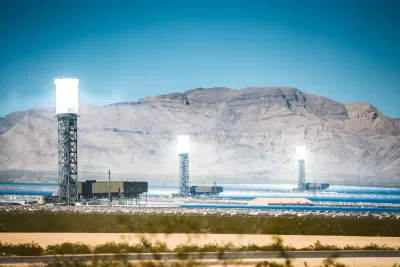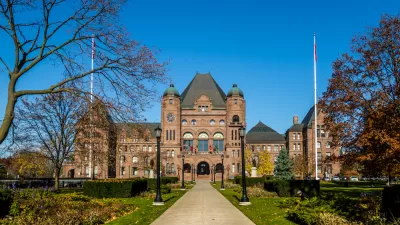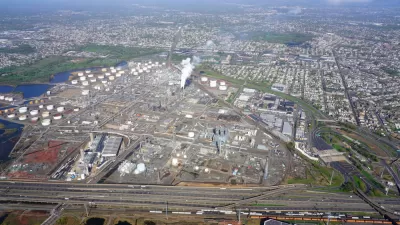A California state senator has proposed to overhaul California’s cap-and-trade system explains the changes he wants to see.

California successfully defended its cap-and-trade program from a recent legal challenge, but it still has to wrestle with what will happen when the program expires in 2020—especially since the state emissions reduction target extends to 2030.
One proposal, from Senator Bob Wieckowski, is to essentially replace the current system with a new version of cap and trade that would change both how carbon is priced and how the revenues are spent. In The Planning Report, Wieckowski describes the three broad categories of investment his plan would create: climate research, infrastructure adaptation, and a new consumer program called "climate dividends."
"When we set a cap, there is necessarily going to be an increase in the price of gasoline and carbon-based products," he explains. "The idea is to return some of the money generated to the consumer, to ease the increased direct costs that we anticipate."
He also wants to see the state's investment in infrastructure shift to prioritize the upgrade or even relocation of basic facilities like sewers and roads, especially in disadvantaged communities.
Some of these facilities are located in areas that are endangered by sea-level rise and climate change. As we rebuild them, it may not be possible to simply fortify the surrounding ground. They may actually have to be moved to, for lack of a better term, higher ground. That’s quite a change from how we’re using cap-and-trade funds right now.
New technologies and innovations, meanwhile, would be explored through a third bucket of money dedicated to researching best climate adaptation practices. That approach speaks to Wieckowski's broader vision of where California fits into the global effort toward resilience.
"California's forte is the export of problem-solving ideas and devices that can help out the rest of the world," he says. Especially in light of the Trump administration's "disinterest" in climate action, he says, "People are looking for answers from us. How California goes, the world wants to go."
FULL STORY: State Senator Wieckowski Offers Alternative to Post-2020 Cap and Trade

Alabama: Trump Terminates Settlements for Black Communities Harmed By Raw Sewage
Trump deemed the landmark civil rights agreement “illegal DEI and environmental justice policy.”

Study: Maui’s Plan to Convert Vacation Rentals to Long-Term Housing Could Cause Nearly $1 Billion Economic Loss
The plan would reduce visitor accommodation by 25% resulting in 1,900 jobs lost.

Planetizen Federal Action Tracker
A weekly monitor of how Trump’s orders and actions are impacting planners and planning in America.

Wind Energy on the Rise Despite Federal Policy Reversal
The Trump administration is revoking federal support for renewable energy, but demand for new projects continues unabated.

Passengers Flock to Caltrain After Electrification
The new electric trains are running faster and more reliably, leading to strong ridership growth on the Bay Area rail system.

Texas Churches Rally Behind ‘Yes in God’s Back Yard’ Legislation
Religious leaders want the state to reduce zoning regulations to streamline leasing church-owned land to housing developers.
Urban Design for Planners 1: Software Tools
This six-course series explores essential urban design concepts using open source software and equips planners with the tools they need to participate fully in the urban design process.
Planning for Universal Design
Learn the tools for implementing Universal Design in planning regulations.
Caltrans
Smith Gee Studio
Institute for Housing and Urban Development Studies (IHS)
City of Grandview
Harvard GSD Executive Education
Toledo-Lucas County Plan Commissions
Salt Lake City
NYU Wagner Graduate School of Public Service




























